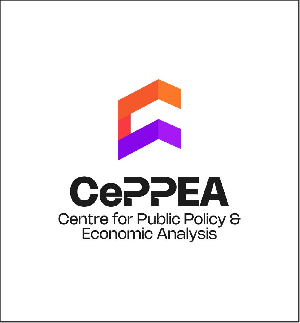The Centre for Policy and Economic Analysis (CePPEA) has lauded the efforts of the Finance minister, Dr. Mohammed Amin Adam, for his adept handling of Ghana's economy amid challenging global economic conditions.
During a press engagement with journalists, Executive Director of CePPEA, Julius Gyimah, praised the minister for his strategic fiscal policies that have not only stabilized the economy but also positioned it for sustainable growth.
Despite global economic uncertainties and the lingering effects of the COVID-19 pandemic, Ghana's economy has shown commendable resilience. The country's growth rate has consistently surged, reflecting the positive impacts of well-implemented economic policies.
“The continuous growth we are witnessing is a testament to the Finance Minister's effective strategies and commitment to economic resilience,” Mr. Gyimah noted. This surge is largely driven by an expansion in the industrial sector, coupled with strategic investments in key areas such as agriculture and technology.
One of the standout achievements of the minister, he explained, has been the impressive completion of Ghana's bilateral and multilateral debt exchanges. This significant milestone has not only relieved the country of a substantial debt burden but also restored investor confidence.
Mr. Gyimah highlighted, “Successfully negotiating our debt exchanges has not only provided fiscal space but also signaled to the international community that Ghana is a reliable and prudent financial partner.” This achievement underscores the Finance Minister's adeptness in navigating complex financial negotiations and securing favorable outcomes for the nation.
A particularly noteworthy aspect of the Finance minister's Mid-Year Budget Review was the absence of requests for additional funding or a supplementary budget, a move Mr. Gyimah described as "commendable," especially in an election year. "In many economies, election years are often characterized by fiscal indiscipline and the proliferation of supplementary budgets. It is refreshing to see that the government is committed to maintaining fiscal discipline, even under the pressure of upcoming elections," he said. This disciplined approach, according to CePPEA, signals the government's commitment to sustainable economic policies that prioritize long-term stability over short-term political gains.
Moreover, the government has refrained from introducing new taxes or increasing existing ones, which CePPEA views as a positive step towards easing the financial burden on citizens and businesses. "At a time when global inflationary pressures are squeezing household incomes, the decision not to introduce new taxes is a relief to many Ghanaians," Mr. Gyimah remarked. He added that this policy choice demonstrates a balanced approach to revenue generation, focusing on efficiency and broadening the tax base rather than imposing additional burdens on the populace.
In line with efforts to ease the cost of government business on Ghanaians, there has been a downward review of expenditure. This strategic measure aims to optimize government spending and ensure that resources are utilized efficiently. “The downward review of expenditure is a commendable move that highlights the government’s commitment to fiscal responsibility. It ensures that taxpayer money is spent wisely and effectively,” Mr. Gyimah added. This review is expected to streamline government operations, reduce wastage, and ultimately translate into better service delivery for citizens.
In light of these achievements, CePPEA expressed confidence in the Finance Ministry's ability to navigate the country's economic challenges. "CePPEA reposes confidence in the government's continued commitment to sound fiscal management and the well-being of the Ghanaian people," Mr. Gyimah concluded. He said the Center looks forward to seeing further positive developments as Ghana continues on its path to economic recovery and growth.
Business News of Friday, 26 July 2024
Source: www.ghanaweb.com













